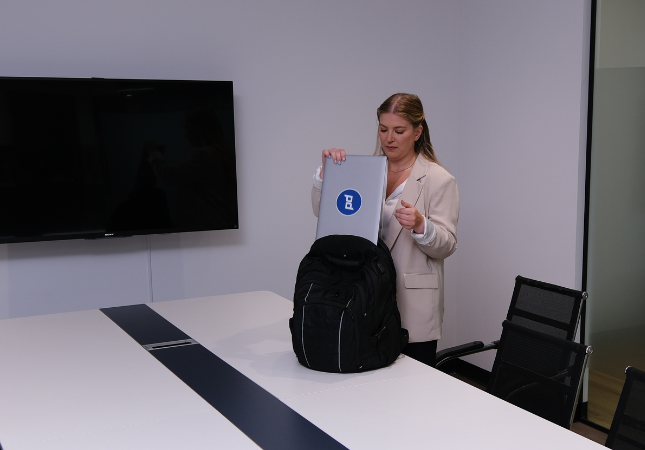You have heard it many times: failure to plan means planning to fail. Depositions sometimes offer a poignant example of this maxim.
Many lawyers schedule a deposition and do nothing more than notify their client of when and where to appear. Others give short shrift to the preparation process, advising the client to arrive 30 minutes early on the day of the deposition.
Minimizing the importance of deposition preparation adds to your client’s nervousness. It can significantly impact the outcome of the case.
Whether you are looking for a large settlement or are trying to avoid a summary judgment, the deposition can be a pivotal point in the case. The American Bar Association recommends treating all clients as novices, regardless of their prior litigation experience.
Here are five deposition preparation tips that can improve the outcome of your case.
Draft a Template Letter You Can Use for Each Client’s Deposition Preparation
Provide each client with a hard copy letter that he or she can study and refer to in the weeks leading up to the deposition. At a minimum, the letter should accomplish the following:
- Explain to the client what a deposition is (perhaps even providing a nutshell version of the applicable rule of civil procedure)
- Identify the reasons depositions are taken (evidence at trial, discovery, witness impeachment, observation of witness’s candor, responsiveness, and how the deponent might appear to a jury)
- Emphasize that a deposition is virtually the same as giving testimony in court, except that no judge or jury is present
- Detail the expected conduct and procedures (honesty, when to respond, importance of understanding the question, etc.)
- Encourage the client to review any written discovery answers he or she may have provided to opposing counsel prior to the deposition
The client should understand that the deposition is not an opportunity to convince anyone — including opposing counsel — about how great the claim is or how right the client is.
In discussing deposition preparation with your client, remember that your vernacular sounds like jargon to a layperson. Get feedback from your client to ensure they know what you mean.
Consult a Pattern Discovery Treatise
A pattern discovery checklist will prepare you to give your client a mock deposition. It will also help you suss out and research any possible privilege or Fifth Amendment objections in advance of the deposition.
You can even give a copy of the pattern discovery checklist to your client, to make sure he or she understands the elements of the claim. Even an elementary understanding of claims and defenses may prevent your client from volunteering information that, while truthful, results in losing the case.
In one case, a plaintiff sued a fitness facility after a protrusion on a misplaced piece of equipment caught her sweatpants, causing her to fall hard onto a concrete floor and resulting in traumatic brain injury.
This plaintiff was so full of righteous indignation that when opposing counsel asked her whether she saw the protuberance before she fell, she adamantly said “yes, of course! It was there plain as day!” (She had previously told her counsel that she hadn’t seen it.)
She did not understand that if she saw a danger, the duty shifted to her to avoid it. Her dishonesty was motivated by a lack of knowledge about the law. (Result? Summary judgment for the defendant on the basis of open and obvious danger.)
Schedule a Deposition Preparation Meeting
This meeting should have a clear agenda and take at least two hours. Be sure your client can answer questions about his/her written discovery responses. Reviewing the pleadings is also a good idea.
Show your client a video-recorded deposition just to observe what the process looks like. Many commercially made products on the market effectively demonstrate dos and don’ts of giving a good deposition.
Showing the client such a video ensures consistent delivery of information among clients and shows the client what to expect.
Conduct a Mock Deposition
Help your client become more alert to double meanings, factual assumptions, and long, complex questions. Answering questions in an evidentiary proceeding is different from answering other questions. Request that the mock deposition be videotaped so you can review your client’s facial expressions, physical reactions, and tone.
Send your client transcripts or videos of previously taken depositions with similar subject matter. The formal flow of a deposition is not as it appears in the movies. They should know what to expect, from being sworn in to answering questions they may not deem relevant.
In our everyday lives, we are usually quick to answer questions (sometimes even before the question is asked). Your client may need to practice a new cadence of question and answer.
Tell your client that the deposition transcript will not reflect the amount of time it takes to respond to a question (unless videography is involved). Tell your client to pause before answering so that it gives you time to object to the question, if appropriate.
Your client should get used to providing the following responses: “yes,” “no,”I don’t recall,” “I don’t know,” and “can you please rephrase the question?”
The client should also know that while cases are not won at a deposition, they can be lost. Loose lips sink ships, as the saying goes.
Be Mindful of Your Client’s Deposition Day Nerves
When you do what you do every day, it is easy to overlook how your client feels about what’s to come.
Make sure you allow enough time with your client on the day of the deposition not only to address any last-minute concerns but also to engage in some small talk about the client’s hobbies, family, etc. This may help keep things in perspective.
Deponents tend to ramble when nervous. Remind your client to testify only to those matters within his/her personal memory or knowledge and to answer closed-ended questions with a “yes” or “no.”
You may even want to ask your client in advance of the deposition what music he or she sings or listens to (if any) to relax. Having your client’s favorite beverage on hand and playing his or her favorite music may help ease your client into the right frame of mind.
Conclusion
With so much riding on the deposition, both you and your client should spend ample time preparing.
Preparation should include retaining a certified court reporter who can help you build a reliable record. Contact Planet Depos to learn how they can help your next deposition go smoothly.
About the Author: Henry Floyd, Jr., Esquire
Maryland injury lawyer Henry Floyd, Jr. is an Associate Attorney at the firm of Koonz, McKenney, Johnson, DePaolis & Lightfoot L.L.P. Mr. Floyd is admitted to the United States District Court for the District of Maryland. He is currently a member of the Maryland State Bar Association, the Prince George’s County Bar Association, the DC Trial Lawyers Association, the American Association for Justice, the Washington Bar Association, and the J. Franklyn Bourne Bar Association. Mr. Floyd represents clients in workers’ compensation claims in Maryland and Washington, D.C. and a wide range of personal injury areas, including car accidents and premises liability.[/et_pb_text][/et_pb_column][/et_pb_row][/et_pb_section]


